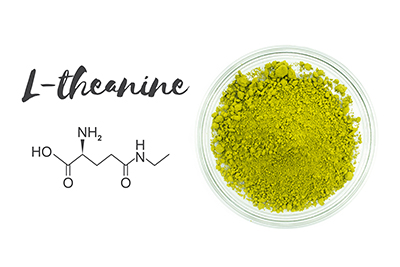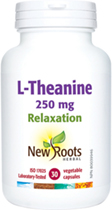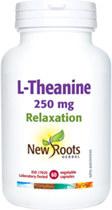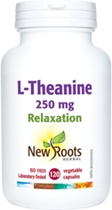L-Theanine: A Mental Health Hero
Theanine is an amino acid analogue of l-glutamate and l-glutamine and is found naturally occurring in green tea. Its chemical name is l-gamma-glutamylethylamide, or N5-ethyl-l-glutamine. Theanine is absorbed in the small intestine, and can be hydrolyzed to glutamate and ethylamine, or it can remain intact as theanine. Another fate of theanine is to be metabolized by glutamate decarboxylase to yield gamma-aminobutyric acid (GABA). Theanine can also cross the blood-brain barrier and have direct neurological effects. Theanine has long been regarded as the constituent of green tea responsible for calming effects, counteracting the stimulatory effects of caffeine.[1][2][3]
Clinical Evidence
In a landmark clinical trial, a “realistic dietary intake” of l-theanine was administered to healthy participants versus placebo, and they were subjected to electroencephalogram (EEG).[4] Relative to placebo, EEG revealed that l-theanine increases the alpha waveband of brain frequency. This suggests l-theanine is relaxing without inducing drowsiness. This important paper promptly led to an impressive accumulation of clinical trials focused on l-theanine.
Clinical intervention trials have evaluated l-theanine for a wide array of indications. These include mental health including depression, anxiety, and schizophrenia; psychological and physiological stress responses; cognitive function; focus, attention, and concentration; alertness; and sleep quality. We were able to identify over 30 controlled human intervention trials of theanine for these various outcomes. Below, we summarize a selection of these human studies.
Ninety-three (93) boys with a diagnosis of ADD received 400 mg per day of l-theanine or placebo for six weeks. The main outcome measure was the use of a watch that tracked outcomes related to sleep quality. Boys receiving l-theanine experienced significantly better sleep percentage (time truly asleep) and sleep efficiency.[5]
 The impact of l-theanine was studied in 30 healthy people for its impact on stress, depression, anxiety, and sleep. Participants received 200 mg per day of l-theanine for four weeks. Regarding sleep, l-theanine achieved improved sleep latency, reduced sleep disturbance, and reduced use of sleep medication. Regarding cognitive function, l-theanine improved verbal fluency and executive function.[6]
The impact of l-theanine was studied in 30 healthy people for its impact on stress, depression, anxiety, and sleep. Participants received 200 mg per day of l-theanine for four weeks. Regarding sleep, l-theanine achieved improved sleep latency, reduced sleep disturbance, and reduced use of sleep medication. Regarding cognitive function, l-theanine improved verbal fluency and executive function.[6]
Twenty (20) individuals with a diagnosis of major depressive disorder received 250 mg per day of l-theanine added to prescription antidepressant therapy. l-Theanine improved sleep, mood, anxiety, and cognition. Regarding cognition, l-theanine improved response latency, error rate, verbal memory, and executive function.[7]
Several studies have added l-theanine to prescription antipsychotic therapy for individuals with a diagnosis of schizophrenia. Such studies use the Positive and Negative Syndrome Scale (PANSS) as a means to determine treatment efficacy. One such study gave 400 mg per day of l-theanine for eight weeks. l-Theanine reduced anxiety and benefited positive symptoms, general psychopathology, and activation factor on the PANSS scale.[8] Another study gave 250 mg per day of l-theanine to 17 individuals with schizophrenia. PANSS revealed positive symptoms and sleep were improved.[9]
Lastly, 20 healthy individuals received 200 mg per day l-theanine, 160 mg per day of caffeine, or both. l-Theanine, with or without caffeine, was shown to improve attention.[10]
Discussion
l-Theanine has a very rich history of safe use across a broad range of doses. Human studies typically administer 200–400 mg per day. l-Theanine has also demonstrated an excellent safety profile when combined with a wide array of prescription medications used in the realm of mental health, most notably antidepressants and antipsychotics. Our brief review of human studies of l-theanine highlights an important role across a broad range of common mental health concerns, including depression and anxiety, schizophrenia, sleep, and even a role in ADD for focus and concentration.
References
- Nathan, P.J., et al. “The neuropharmacology of l-theanine(N-ethyl-l-glutamine): A possible neuroprotective and cognitive enhancing agent.” Journal of Herbal Pharmacotherapy, Vol. 6, No. 2 (2006): 21–30.
- Türközü, D., and M. Şanlier. “l-Theanine, unique amino acid of tea, and its metabolism, health effects, and safety.” Critical Reviews in Food Science and Nutrition, Vol. 57, No. 8 (2017): 1681–1687.
- Wikipedia, s.v. “Theanine,” last modified September 24, 2020, 17:10, https://en.wikipedia.org/wiki/Theanine.
- Nobre, A.C., A. Rao, and G.N. Owen. “l-Theanine, a natural constituent in tea, and its effect on mental state.” Asia Pacific Journal of Clinical Nutrition, Vol. 17, Suppl. 1 (2008): 167–168.
- Lyon, M.R., M.P. Kapoor, and L.R. Juneja. “The effects of l-theanine (Suntheanine®) on objective sleep quality in boys with attention deficit hyperactivity disorder (ADHD): A randomized, double-blind, placebo-controlled clinical trial.” Alternative Medicine Review, Vol. 16, No. 4 (2011): 348–354.
- Hidese, S., et al. “Effects of l-theanine administration on stress-related symptoms and cognitive functions in healthy adults: A randomized controlled trial.” Nutrients, Vol. 11, No. 10 (2019):2362.
- Hidese, S., et al. “Effects of chronic l-theanine administration in patients with major depressive disorder: An open-label study.” Acta Neuropsychiatrica, Vol. 29, No. 2 (2017): 72–79.
- Ritsner, M.S., et al. “l-Theanine relieves positive, activation, and anxiety symptoms in patients with schizophrenia and schizoaffective disorder: An 8-week, randomized, double-blind, placebo-controlled, 2-center study.” The Journal of Clinical Psychiatry, Vol. 72, No. 1 (2011): 34–42.
- Ota, M., et al. “Effect of l-theanine on glutamatergic function in patients with schizophrenia.” Acta Neuropsychiatrica, Vol. 27, No. 5 (2015): 291–296.
- Kahathuduwa, C.N., et al. “Acute effects of theanine, caffeine and theanine-caffeine combination on attention.” Nutritional Neuroscience, Vol. 20, No. 6 (2017): 369–377.

 Stores
Stores


